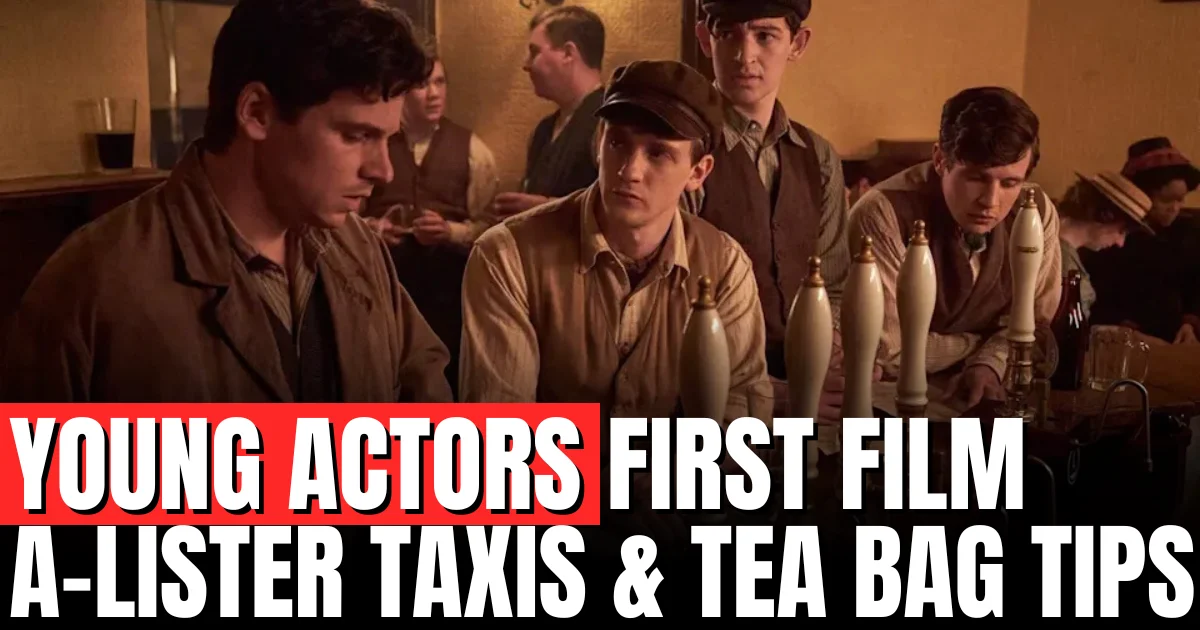Emerging actors share hilarious first film experiences from sharing rides with celebrities to unusual tip traditions. Behind-the-scenes Hollywood stories.
Table of Contents
Taxis with A-Listers and Tea Bag Tips: Young Actors Share Hilarious First Film Experiences
Breaking into Hollywood means navigating unexpected situations from sharing cramped transportation with Oscar winners to discovering peculiar on-set traditions. Emerging actors are pulling back the curtain on their first film experiences, revealing both glamorous and surprisingly mundane realities of the entertainment industry.
These candid stories offer aspiring performers glimpses into what actually happens when dreams meet reality on professional film sets. The tales range from heartwarming celebrity mentorship to awkward encounters that became cherished memories.
The Taxi Tales: When Carpools Get Star-Studded
Budget constraints on film productions often create unlikely scenarios where newcomers share transportation with established stars. These intimate moments in cramped vehicles produce some of the industry’s best behind-the-scenes stories.
Memorable carpool experiences:
Young British actress Emma Richardson recalls squeezing into a production taxi with two Academy Award winners during her debut film. “There I was, sandwiched between Hollywood royalty, trying not to fangirl while discussing the weather,” she laughs. The A-listers treated the situation with humor, sharing industry advice during the 30-minute ride.
American actor Jordan Martinez describes his surreal commute with a legendary action star known for blockbuster franchises. “He spent the entire ride asking about my training and offering tips on stunt work,” Martinez shares. “I couldn’t believe someone that famous cared about helping a nobody like me.”
These taxi encounters often become icebreakers that ease nervous newcomers into professional environments. Established actors frequently use shared transportation time for informal mentorship, knowing they experienced similar anxiety during their own early projects.
Why carpools happen:
Production companies coordinate transportation logistics to reduce costs and environmental impact. Rather than individual vehicles for every cast member, communal rides make financial and practical sense.
Location shooting often involves remote settings with limited parking and access. Shuttling entire casts together ensures timely arrivals and simplified coordination.
The practice democratizes film sets somewhat, forcing interactions across experience levels that might not otherwise occur. These unplanned moments create bonding opportunities and networking connections.
The Tea Bag Tip Tradition Explained
One of the quirkier customs newcomers encounter involves tips left in dressing rooms and trailers. The “tea bag tip” tradition confuses American actors unfamiliar with British film set culture.
Understanding the custom:
On British productions, crew members traditionally leave tea bags in talent trailers as welcoming gestures. This simple courtesy reflects the UK’s tea-drinking culture and demonstrates hospitality.
Some productions evolved this into a tipping custom where actors leave tea, coffee, and snacks for crew members as appreciation gestures. Young actors learn quickly that these small kindnesses build positive reputations.
The tradition extends beyond literal tea bags to encompass various considerate acts including bringing treats for crew, remembering names, and expressing genuine gratitude. Established stars often model this behavior, teaching newcomers through example.
Lessons in set etiquette:
First-time film actors discover that professional success depends partly on treating everyone respectfully regardless of position. Crew members remember kind actors and eagerly work with them again.
Coffee runs, snack sharing, and simple thank-yous create positive atmospheres that improve everyone’s experience. Productions function as collaborative communities where morale significantly impacts results.
Young performers who arrive with entitled attitudes quickly develop poor reputations that follow them throughout careers. Conversely, those demonstrating humility and appreciation earn industry goodwill worth far more than paychecks.
Reality Checks: Glamour Meets Mundane
First film experiences often shatter romanticized notions about moviemaking. Young actors confront realities that film school and acting classes don’t fully prepare them for.
Common surprises newcomers face:
Endless Waiting
Shooting schedules involve extensive downtime between setups. Actors spend hours in trailers or holding areas waiting for their scenes. Learning to stay mentally prepared while killing time becomes essential.
Unglamorous Conditions
Location shoots mean working in extreme weather, uncomfortable costumes, and less-than-luxurious accommodations. The perceived glamour disappears quickly when filming outdoors in freezing temperatures or scorching heat.
Technical Repetition
Directors require multiple takes from various angles for editing flexibility. Delivering consistent emotional performances across twenty takes challenges even experienced actors and exhausts beginners.
Early Call Times
Four a.m. makeup calls shock newcomers accustomed to theatrical schedules. Film production maximizes daylight and equipment rental periods, requiring brutal hours from everyone involved.
Celebrity Mentorship Moments
Established stars often take emerging talent under their wings, offering guidance that shapes entire careers. These mentorship moments represent highlights that young actors treasure permanently.
Impactful advice from A-listers:
Actress Sophie Chen recalls a veteran performer pulling her aside before an emotional scene. “She shared a breathing technique that completely changed my approach to intense moments,” Chen explains. “That thirty-second conversation improved my craft immeasurably.”
Actor Marcus Thompson describes how a comedy legend taught him about timing and improvisation between takes. “He treated me like a colleague rather than a kid, which gave me confidence I desperately needed,” Thompson shares.
These generous acts of mentorship often stem from established actors remembering their own difficult beginnings. Many celebrities actively seek opportunities to help newcomers navigate challenging industry waters.
Creating industry connections:
Relationships formed during first projects frequently lead to future collaborations. Directors and actors who witness young talent’s professionalism remember them for subsequent casting opportunities.
Crew members who enjoy working with particular actors recommend them to colleagues on other productions. The entertainment industry operates significantly through personal networks and reputation.
Social media expanded mentorship possibilities with established stars offering advice publicly to aspiring performers. However, in-person set relationships remain most valuable for genuine career development.
Learning Professional Set Behavior
First film experiences teach crucial lessons about professional conduct that distinguish successful long-term careers from brief appearances.
Essential professionalism lessons:
Preparation Requirements
Arriving completely prepared with lines memorized, character research completed, and physical requirements met represents baseline expectations. Professionals never waste others’ time through inadequate preparation.
Flexibility and Adaptation
Scripts change, shooting schedules shift, and creative directions evolve rapidly. Successful actors adapt gracefully rather than complaining about modifications.
Collaborative Spirit
Film production requires teamwork across departments. Actors who understand their role within larger collaborative processes earn respect and repeat employment.
Emotional Regulation
Managing performance anxiety, criticism, and disappointment professionally separates sustainable careers from brief industry encounters. Young actors learn emotional resilience through experience.
Financial Realities of Early Roles
First film paychecks often disappoint actors expecting Hollywood riches immediately. Understanding entertainment industry economics prevents disillusionment and poor financial decisions.
Economic truths for newcomers:
Entry-level roles rarely pay substantially, especially in independent productions where emerging actors typically start. Many performers maintain survival jobs while building credits and experience.
Agent commissions, union dues, headshots, classes, and travel expenses consume significant portions of early earnings. The investment required to sustain acting careers surprises many newcomers.
Health insurance and retirement benefits don’t exist for most freelance performers. Financial planning becomes crucial for managing irregular income and protecting against industry uncertainties.
Success stories involving overnight stardom and immediate wealth represent extreme exceptions rather than typical experiences. Most working actors build careers gradually through consistent effort over years.
Diversity of First Film Experiences
Not all debut film experiences occur on major studio productions with massive budgets. Young actors enter the industry through various pathways offering different lessons.
Different entry points:
Independent Films
Low-budget indie productions offer creative freedom and substantial roles unavailable in bigger projects. Limited resources teach problem-solving and collaboration under constraints.
Studio Blockbusters
Large-scale productions provide exposure to cutting-edge technology and elaborate production systems. However, newcomers often receive smaller roles with less creative input.
Streaming Platform Originals
Digital platforms created new opportunities for emerging talent. These productions often blend indie sensibilities with professional budgets and distribution.
Short Films and Festivals
Festival circuit projects build credentials and industry connections. Success at prestigious festivals launches many acting careers despite modest initial scope.
Advice from Those Who’ve Been There
Young actors who recently navigated first film experiences offer guidance to those following similar paths.
Practical wisdom for aspiring actors:
Embrace every learning opportunity regardless of project size or role significance. Each experience builds skills and connections valuable for career development.
Treat everyone with respect and kindness from production assistants to executive producers. You never know who will influence your next opportunity.
Manage expectations realistically while maintaining passion and commitment. Success rarely follows straight paths or predictable timelines.
Invest in continuous training and skill development. The learning never stops for professional actors regardless of experience level.
Build genuine relationships rather than transactional networking. Authentic connections based on mutual respect outlast superficial industry acquaintances.
FAQ SECTION
1. What does the ‘tea bag tip’ tradition mean on film sets?
The tea bag tip tradition originates from British film productions where crew members leave tea bags in talent trailers as welcoming gestures, reflecting UK tea-drinking culture. The custom evolved to include actors leaving refreshments for crew members as appreciation. More broadly, it represents the etiquette of small kindnesses and gratitude that build positive on-set relationships and professional reputations in the entertainment industry.
2. Why do young actors share taxis with A-list celebrities?
Production companies coordinate communal transportation to reduce costs, minimize environmental impact, and simplify logistics, especially during location shoots with limited parking. These shared rides create unexpected mentorship opportunities where established stars offer advice and encouragement to nervous newcomers. The practice democratizes film sets somewhat, forcing interactions across experience levels that build camaraderie and networking connections.
3. How much do actors make on their first film?
First film paychecks vary dramatically depending on production budget, role size, and union status. Independent films might pay SAG-AFTRA minimum rates (around 125−125−1,000 per day) or even deferred payment. Studio productions pay more but newcomers typically receive small roles. After agent commissions (10%), manager fees (10-15%), taxes, and professional expenses like headshots and classes, actual take-home earnings are often quite modest.
4. What’s the most important lesson young actors learn on first films?
Professional conduct and treating everyone with respect consistently ranks as the most crucial lesson. The entertainment industry operates significantly through reputation and personal networks. Crew members, fellow actors, and directors remember kind, prepared, flexible performers and eagerly work with them again. Conversely, entitled or unprofessional behavior creates reputations that damage careers regardless of talent level.
5. How do young actors get their first film roles?
Common pathways include talent agency submissions, casting director relationships built through auditions, film school connections leading to independent projects, social media discovery by casting directors, theater work attracting film industry attention, and networking at industry events. Most actors build careers gradually through combination of training, persistent auditioning, relationship building, and maintaining survival jobs while pursuing opportunities.
CONCLUSION
The journey from aspiring actor to working professional involves navigating surreal moments like sharing cramped taxis with Oscar winners and learning peculiar traditions like tea bag etiquette. These first film experiences shape careers by teaching essential lessons about professionalism, collaboration, and industry realities.
Young actors discovering that glamorous filmmaking involves extensive waiting, unglamorous conditions, and modest paychecks face important reality checks. Those who adapt, demonstrate humility, and treat everyone respectfully position themselves for sustainable careers beyond brief industry encounters.
The mentorship moments, unexpected friendships, and hard-won wisdom gained during debut projects become treasured memories that inform entire careers. Whether sharing transportation with A-listers or learning set etiquette through small kindnesses, these experiences transform dreamers into working professionals.
What was your most memorable first-time professional experience in any industry? How did established professionals help you navigate new territory? Share your stories in the comments!

